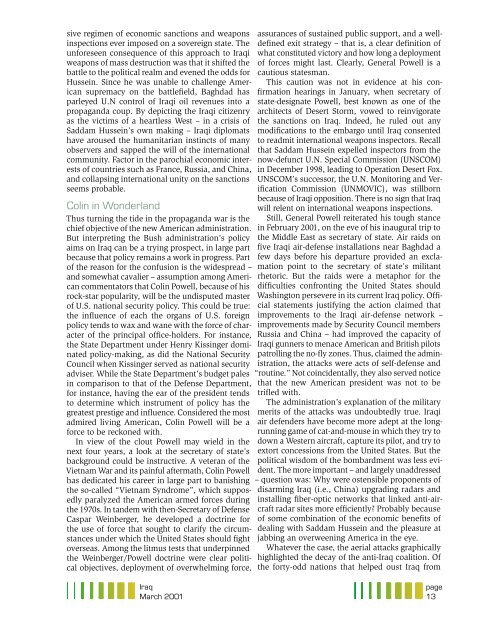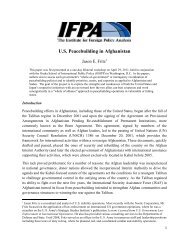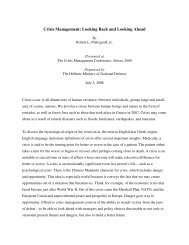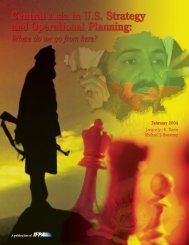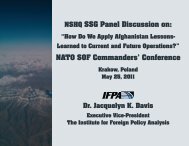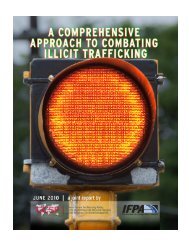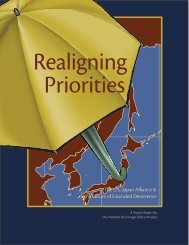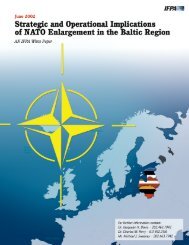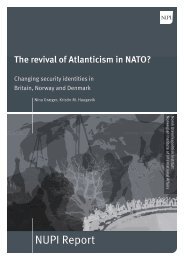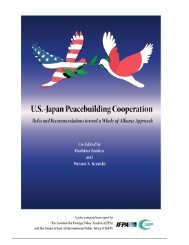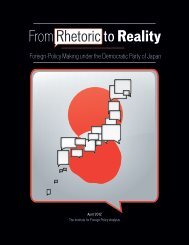March 2001 - Institute for Foreign Policy Analysis
March 2001 - Institute for Foreign Policy Analysis
March 2001 - Institute for Foreign Policy Analysis
Create successful ePaper yourself
Turn your PDF publications into a flip-book with our unique Google optimized e-Paper software.
sive regimen of economic sanctions and weapons<br />
inspections ever imposed on a sovereign state. The<br />
un<strong>for</strong>eseen consequence of this approach to Iraqi<br />
weapons of mass destruction was that it shifted the<br />
battle to the political realm and evened the odds <strong>for</strong><br />
Hussein. Since he was unable to challenge American<br />
supremacy on the battlefield, Baghdad has<br />
parleyed U.N control of Iraqi oil revenues into a<br />
propaganda coup. By depicting the Iraqi citizenry<br />
as the victims of a heartless West – in a crisis of<br />
Saddam Hussein’s own making – Iraqi diplomats<br />
have aroused the humanitarian instincts of many<br />
observers and sapped the will of the international<br />
community. Factor in the parochial economic interests<br />
of countries such as France, Russia, and China,<br />
and collapsing international unity on the sanctions<br />
seems probable.<br />
Colin in Wonderland<br />
Thus turning the tide in the propaganda war is the<br />
chief objective of the new American administration.<br />
But interpreting the Bush administration’s policy<br />
aims on Iraq can be a trying prospect, in large part<br />
because that policy remains a work in progress. Part<br />
of the reason <strong>for</strong> the confusion is the widespread –<br />
and somewhat cavalier – assumption among American<br />
commentators that Colin Powell, because of his<br />
rock-star popularity, will be the undisputed master<br />
of U.S. national security policy. This could be true:<br />
the influence of each the organs of U.S. <strong>for</strong>eign<br />
policy tends to wax and wane with the <strong>for</strong>ce of character<br />
of the principal office-holders. For instance,<br />
the State Department under Henry Kissinger dominated<br />
policy-making, as did the National Security<br />
Council when Kissinger served as national security<br />
adviser. While the State Department’s budget pales<br />
in comparison to that of the Defense Department,<br />
<strong>for</strong> instance, having the ear of the president tends<br />
to determine which instrument of policy has the<br />
greatest prestige and influence. Considered the most<br />
admired living American, Colin Powell will be a<br />
<strong>for</strong>ce to be reckoned with.<br />
In view of the clout Powell may wield in the<br />
next four years, a look at the secretary of state’s<br />
background could be instructive. A veteran of the<br />
Vietnam War and its painful aftermath, Colin Powell<br />
has dedicated his career in large part to banishing<br />
the so-called “Vietnam Syndrome”, which supposedly<br />
paralyzed the American armed <strong>for</strong>ces during<br />
the 1970s. In tandem with then-Secretary of Defense<br />
Caspar Weinberger, he developed a doctrine <strong>for</strong><br />
the use of <strong>for</strong>ce that sought to clarify the circumstances<br />
under which the United States should fight<br />
overseas. Among the litmus tests that underpinned<br />
the Weinberger/Powell doctrine were clear political<br />
objectives, deployment of overwhelming <strong>for</strong>ce,<br />
assurances of sustained public support, and a welldefined<br />
exit strategy – that is, a clear definition of<br />
what constituted victory and how long a deployment<br />
of <strong>for</strong>ces might last. Clearly, General Powell is a<br />
cautious statesman.<br />
This caution was not in evidence at his confirmation<br />
hearings in January, when secretary of<br />
state-designate Powell, best known as one of the<br />
architects of Desert Storm, vowed to reinvigorate<br />
the sanctions on Iraq. Indeed, he ruled out any<br />
modifications to the embargo until Iraq consented<br />
to readmit international weapons inspectors. Recall<br />
that Saddam Hussein expelled inspectors from the<br />
now-defunct U.N. Special Commission (UNSCOM)<br />
in December 1998, leading to Operation Desert Fox.<br />
UNSCOM’s successor, the U.N. Monitoring and Verification<br />
Commission (UNMOVIC), was stillborn<br />
because of Iraqi opposition. There is no sign that Iraq<br />
will relent on international weapons inspections.<br />
Still, General Powell reiterated his tough stance<br />
in February <strong>2001</strong>, on the eve of his inaugural trip to<br />
the Middle East as secretary of state. Air raids on<br />
five Iraqi air-defense installations near Baghdad a<br />
few days be<strong>for</strong>e his departure provided an exclamation<br />
point to the secretary of state’s militant<br />
rhetoric. But the raids were a metaphor <strong>for</strong> the<br />
difficulties confronting the United States should<br />
Washington persevere in its current Iraq policy. Official<br />
statements justifying the action claimed that<br />
improvements to the Iraqi air-defense network –<br />
improvements made by Security Council members<br />
Russia and China – had improved the capacity of<br />
Iraqi gunners to menace American and British pilots<br />
patrolling the no-fly zones. Thus, claimed the administration,<br />
the attacks were acts of self-defense and<br />
“routine.” Not coincidentally, they also served notice<br />
that the new American president was not to be<br />
trifled with.<br />
The administration’s explanation of the military<br />
merits of the attacks was undoubtedly true. Iraqi<br />
air defenders have become more adept at the longrunning<br />
game of cat-and-mouse in which they try to<br />
down a Western aircraft, capture its pilot, and try to<br />
extort concessions from the United States. But the<br />
political wisdom of the bombardment was less evident.<br />
The more important – and largely unaddressed<br />
– question was: Why were ostensible proponents of<br />
disarming Iraq (i.e., China) upgrading radars and<br />
installing fiber-optic networks that linked anti-aircraft<br />
radar sites more efficiently Probably because<br />
of some combination of the economic benefits of<br />
dealing with Saddam Hussein and the pleasure at<br />
jabbing an overweening America in the eye.<br />
Whatever the case, the aerial attacks graphically<br />
highlighted the decay of the anti-Iraq coalition. Of<br />
the <strong>for</strong>ty-odd nations that helped oust Iraq from<br />
Iraq<br />
<strong>March</strong> <strong>2001</strong><br />
page<br />
13


